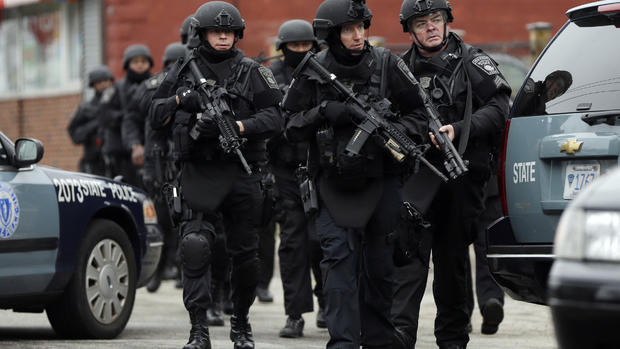Boston lockdown: Muted economic impact
(MoneyWatch) Although the unprecedented lockdown of the city of Boston conjures up fears of major financial losses to businesses and individuals, the economic effects are likely to be minimal.
Mass transportation to, from and within the Boston area was virtually shut down Friday as police conducted a massive manhunt for a suspect in Monday's Boston Marathon bombing. But experts said activity in the city was largely carrying on as usual despite the police action to seal off the city.
"It's not like everyone is going to be home doing nothing," said Jim
Diffley, chief regional economist with IHS Global Insight. "There is a
lot of telecommuting going on that will keep business functioning. And a
lot of shopping and other things that could happen today will just take
place over the weekend or on Monday."
Many experts say the most applicable analogy is not a terrorist attack, but rather a snowstorm that paralyzes a city temporarily. "This is a question we get in Washington when we get a snowstorm," said Stephen Fuller, director of the Center for Regional Analysis at George Mason University. "And the consequences are zero. What you don't do today you do tomorrow. There are winners and losers -- restaurants get hit, but a jewelry store? Those purchases are made later."
Fuller estimates the size of the Boston economy at $330 billion. Economic activity in the metropolitan area amounts to "roughly a billion dollars a day, but most of it is still going on," he said, "just not the same way as on a normal Friday."
Fuller did note that the economic hardships tend to fall on hourly workers who can't telecommute and who may have trouble making up the lost wages in the short term.
As the manhunt continued, the message from authorities to Bostonians Friday -- shared early in the morning via Twitter -- was clear: "Go/stay home." With the search stretching into the afternoon, Amtrak stopped all trains on the heavily traveled corridor between New York and Boston. All major intercity bus lines suspended service to the area.
The city also stopped service on commuter trains into Boston as well as the city's subway, called "the T," and buses. Only air travel functioned normally. Boston Bruin and Red Sox games, along with scheduled performances by the Big Apple Circus, also were postponed.
Barring further attacks, however, the broader financial impact on the city is likely to be fairly minor. "After Sept. 11 there were no long-term confidence issues in New York and Washington in terms of shopping and other economic activities," Diffley said.
- 1 Boston bombing suspect dead; massive manhunt 2nd
- Boston suspects' father calls son a "true angel"
- Uncle of Boston bomb suspect: They're "barbarians"
In the case of New York, thousands of businesses were permanently closed or upended, and many jobs lost. But the city ended up benefiting from more than $20 billion in federal aid over the next two years. In the present case, there was little property damage and business closures are temporary.
And as for the extraordinary overtime costs for police and other workers, those burdens will be covered partly by federal aid. Overnight on Wednesday, President Obama signed an emergency declaration that allows the Department of Homeland Security's Federal Emergency Management Agency to coordinate all disaster relief efforts. The areas affected will be able to recoup 75 percent of their costs from the feds through April 22.
A Senate aide familiar with the matter said it's not clear yet whether Congress will need to appropriate the extra money to pay Boston and surrounding communities or not. After Hurricane Sandy blasted the East Coast in October, a political fight ensued when some lawmakers held up emergency funding for stricken areas.
Bob Maloney, deputy chief of emergency management and public safety for the city of Baltimore, said that in a situation like the one in Boston there is an "incident command system" that includes officials in operations, planning, logistics and finance. "The finance people are tracking costs, and they get everyone to keep track of everything from the fuel in the Blackhawk helicopter to the food and hotel rooms for people coming up from other places."
As for future security costs in Boston, there are certain to be larger outlays of money. The question is where it comes from.
"In the long-term, it is state and local governments that will have to divert some of their resources into higher levels of security, and that will affect economic growth for the long-term," said Alan Clayton-Matthews, an economist with Northeastern University in Boston. "It will increase security and therefore divert public resources toward security. Funds will have to come from somewhere, whether education, social services or maintenance for roads and parks. That's the biggest economic impact of these events."
While Maloney noted that homeland security money flowing to cities and regions has been shrinking since the surge in such funding after September 11, he thinks that with the dramatic events of the last few days that's likely to change. And as for the costs Boston and its surrounding areas will bear this time? He acknowledged that while the shutdown can't go on indefinitely, locking down the city is worthwhile.
"These guys bombed the Boston Marathon," he said. "And the fact that Boston is going after them as though they're Osama Bin Laden, I think it serves the country well. At some point you've got to send a signal out that we're coming after you. Maybe somebody won't go to work today, or be inconvenienced, but it's worth it. I think they're doing the right thing."
